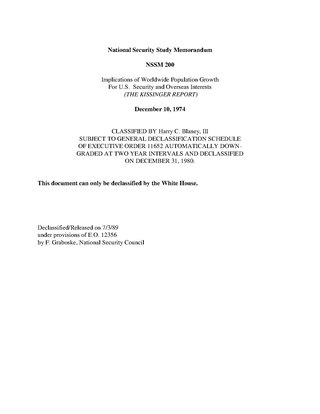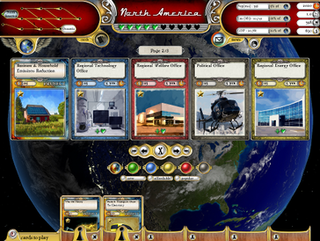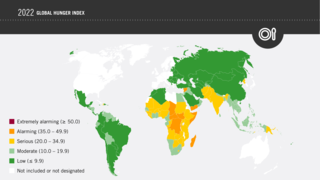Related Research Articles
Health has a variety of definitions, which have been used for different purposes over time. Health can be promoted by encouraging healthful activities, such as regular physical exercise and adequate sleep, and by reducing or avoiding unhealthful activities or situations, such as smoking or excessive stress. Some factors affecting health are due to individual choices, such as whether to engage in a high-risk behavior, while others are due to structural causes, such as whether the society is arranged in a way that makes it easier or harder for people to get necessary healthcare services. Still, other factors are beyond both individual and group choices, such as genetic disorders.

International Physicians for the Prevention of Nuclear War (IPPNW) is a non-partisan federation of national medical groups in 63 countries, representing doctors, medical students, other health workers, and concerned people who share the goal of creating a more peaceful and secure world free from the threat of nuclear annihilation. The organization's headquarters is in Malden, Massachusetts. IPPNW was awarded the Nobel Peace Prize in 1985.

National Security Study Memorandum 200: Implications of Worldwide Population Growth for U.S. Security and Overseas Interests (NSSM200), also known as the "Kissinger Report", was a national security directive completed on December 10, 1974 by the United States National Security Council under the direction of Henry Kissinger following initial orders from President of the United States Richard Nixon.

This is an index of sociology articles. For a shorter list, see List of basic sociology topics.
Global governance refers to institutions that coordinate the behavior of transnational actors, facilitate cooperation, resolve disputes, and alleviate collective action problems. Global governance broadly entails making, monitoring, and enforcing rules. Within global governance, a variety of types of actors – not just states – exercise power. Governance is thus broader than government.
In psychology, right-wing authoritarianism (RWA) is a set of attitudes, describing somebody who is highly submissive to their authority figures, acts aggressively in the name of said authorities, and is conformist in thought and behavior. The prevalence of this attitude in a population varies from culture to culture, as a person's upbringing and education play a strong role in determining whether somebody develops this sort of worldview.

The Institute for Defense Analyses (IDA) is an American non-profit corporation that administers three federally funded research and development centers (FFRDCs) – the Systems and Analyses Center (SAC), the Science and Technology Policy Institute (STPI), and the Center for Communications and Computing (C&C) – to assist the United States government in addressing national security issues, particularly those requiring scientific and technical expertise. It is headquartered in Alexandria, Virginia.
Social dominance theory (SDT) is a social psychological theory of intergroup relations that examines the caste-like features of group-based social hierarchies, and how these hierarchies remain stable and perpetuate themselves. According to the theory, group-based inequalities are maintained through three primary mechanisms: institutional discrimination, aggregated individual discrimination, and behavioral asymmetry. The theory proposes that widely shared cultural ideologies provide the moral and intellectual justification for these intergroup behaviors by serving to make privilege normal. For data collection and validation of predictions, the social dominance orientation (SDO) scale was composed to measure acceptance of and desire for group-based social hierarchy, which was assessed through two factors: support for group-based dominance and generalized opposition to equality, regardless of the ingroup's position in the power structure.

Military simulations, also known informally as war games, are simulations in which theories of warfare can be tested and refined without the need for actual hostilities. Military simulations are seen as a useful way to develop tactical, strategical and doctrinal solutions, but critics argue that the conclusions drawn from such models are inherently flawed, due to the approximate nature of the models used. Many professional analysts object to the term wargames as this is generally taken to be referring to the civilian hobby, thus the preference for the term simulation.
Michael Paul Todaro is an American economist and a pioneer in the field of development economics.

A climate change video game, also known as a global warming game, is a type of serious game.

Social inequality occurs when resources within a society are distributed unevenly, often as a result of inequitable allocation practices that create distinct unequal patterns based on socially defined categories of people. Differences in accessing social goods within society are influenced by factors like power, religion, kinship, prestige, race, ethnicity, gender, age, sexual orientation, and class. Social inequality usually implies the lack of equality of outcome, but may alternatively be conceptualized as a lack of equality in access to opportunity.
Physicians for Social Responsibility (PSR) is a physician-led organization in the US working to protect the public from the threats of nuclear proliferation, climate change, and environmental toxins. It produces and disseminates publications, provides specialized training, offers written and oral testimony to congress, conducts media interviews, and delivers professional and public education. PSR's members and e-activists, state and local chapters, student chapters, and national staff form a nationwide network that target what they consider threats to global survival, specifically nuclear warfare, nuclear proliferation, global warming, and toxic degradation of the environment.

The Global Hunger Index (GHI) is a tool that attempts to measure and track hunger globally as well as by region and by country, prepared by European NGOs of Concern Worldwide and Welthungerhilfe. The GHI is calculated annually, and its results appear in a report issued in October each year.

Rural poverty refers to situations where people living in non-urban regions are in a state or condition of lacking the financial resources and essentials for living. It takes account of factors of rural society, rural economy, and political systems that give rise to the marginalization and economic disadvantage found there. Rural areas, because of their small, spread-out populations, typically have less well maintained infrastructure and a harder time accessing markets, which tend to be concentrated in population centers.

Social protection, as defined by the United Nations Research Institute for Social Development, is concerned with preventing, managing, and overcoming situations that adversely affect people's well-being. Social protection consists of policies and programs designed to reduce poverty and vulnerability by promoting efficient labour markets, diminishing people's exposure to risks, and enhancing their capacity to manage economic and social risks, such as unemployment, exclusion, sickness, disability, and old age. It is one of the targets of the United Nations Sustainable Development Goal 10 aimed at promoting greater equality.
The following outline is provided as an overview of and topical guide to politics and political science:
The World Health Organization (WHO) has defined health as "a state of complete physical, mental, and social well-being and not merely the absence of disease or infirmity." Identified by the 2012 World Development Report as one of two key human capital endowments, health can influence an individual's ability to reach his or her full potential in society. Yet while gender equality has made the most progress in areas such as education and labor force participation, health inequality between men and women continues to harm many societies to this day.

Nuclear famine is a hypothesized famine considered a potential threat following global or regional nuclear exchange. It is thought that even subtle cooling effects resulting from a regional nuclear exchange could have a substantial impact on agriculture production, triggering a food crisis amongst the world's survivors.
References
- 1 2 Archive of original Global Change Game Website
- ↑ Altemeyer, B. (1996). [The Authoritarian Specter. Cambridge, MA: Harvard University Press.
- 1 2 3 4 Altemeyer, Bob (2006). "The Authoritarians". Archived from the original on 4 October 2016. Retrieved 20 January 2016.
- ↑ Mandel, David R. "Simulating history: The problem of contingency." Analyses of Social Issues and Public Policy 3, no. 1 (2003): 177-180.
- ↑ Louis, Winnifred R., Kenneth I. Mavor, and Deborah J. Terry. "Reflections on the statistical analysis of personality and norms in war, peace, and prejudice: Are deviant minorities the problem?." Analyses of Social Issues and Public Policy 3, no. 1 (2003): 189-198.
- ↑ Bramwell, Austin (2006). "Conformists Without Conscience". Archived from the original on 22 October 2022. Retrieved 22 October 2022.
- ↑ Mullen, Elizabeth, Christopher W. Bauman, and Linda J. Skitka. "Avoiding the pitfalls of politicized psychology." Analyses of Social Issues and Public Policy 3, no. 1 (2003): 171-176.
- ↑ Dean, Timothy. "Evolution and moral ecology." PhD diss., University of New South Wales, 2014.